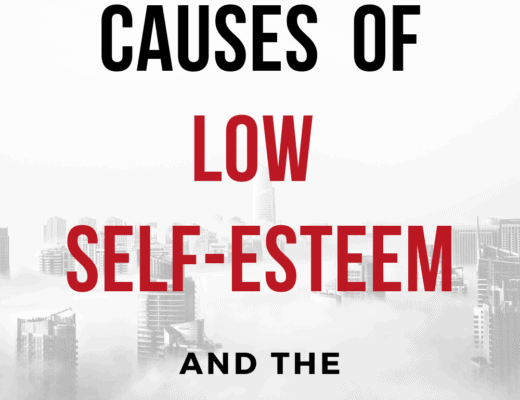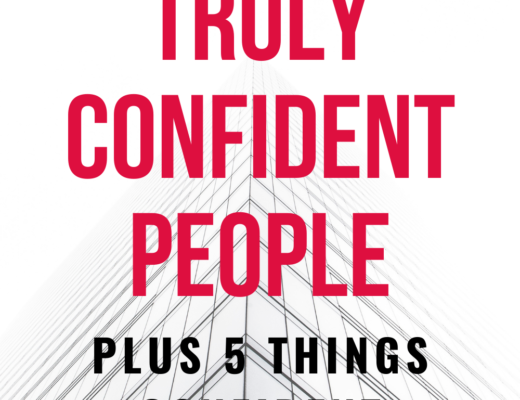Do you feel like a fraud? Worried you will be “found out”? You are suffering from impostor syndrome! Find out what it is and how to overcome impostor syndrome.
If you have ever felt that you don’t belong in the job you currently have, or that the last promotion you received was a fluke, or that the success you have achieved in school, college, work or life is simply down to chance, you might be experiencing imposter syndrome.
Pauline Rose Clance and Suzanne Imes first came up with the concept of Impostor Syndrome in 1978.
Imposter syndrome is an insidious belief that you are not good enough for the job or career you have, or that any success you have achieved was simply chance, or luck.
It is something both men and women suffer from, especially high achievers, but it does seem more common amongst women, due to the more complex societal pressures women face – you need to be pretty, kind, generous, gracious, a good mother, helpful, happy, smile more, a good daughter, a good wife, build a career, while still looking after the house, your husband and the children, etc.
It can cause people a lot of anxiety and even depression.
Moreover, it can hold you back from applying for a job simply because you don’t believe you have the right qualifications, or asking for a raise because you don’t think you deserve it, no matter how much you have achieved.
Imposter syndrome has been reported by some very famous and high achieving women or men, even students.
I had to overcome the question ‘am I good enough?’ It’s dogged me for most of my life. Many women and young girls walk around with that question in their minds. – Michelle Obama
Feelings of impostor syndrome are far more common than you might think, and some of the most successful people around you that you look up to and admire might have suffered from impostor syndrome at some point in their life.
Maybe they’ve learned to deal with it better and to overcome it, or maybe they still feel like a fraud and an impostor on a regular basis.
Related Posts

What is impostor syndrome?
Wikipedia defines imposter syndrome as follow:
“Impostor syndrome (also known as impostor phenomenon, impostorism, fraud syndrome or the impostor experience) is a psychological pattern in which an individual doubts their skills, talents, or accomplishments and has a persistent internalized fear of being exposed as a “fraud”.[1] Despite external evidence of their competence, those experiencing this phenomenon remain convinced that they are frauds and do not deserve all they have achieved. Individuals with impostorism incorrectly attribute their success to luck, or interpret it as a result of deceiving others into thinking they are more intelligent than they perceive themselves to be.”
In her book The Secret Thoughts of Successful Women: Why Capable People Suffer from Impostor Syndrome and How to Thrive in Spite of It, Valerie Young defines it as a “persistent belief in their lack of intelligence, skills, or competence.”
In layman’s terms, imposter syndrome is when you believe that no matter what success you have achieved in life, it’s just down to luck or chance. In other words, it’s not because you are smart, intelligent, hard working, competent or responsible.
It makes you feel like a fraud or a phony, and you often feel like it’s only a matter of time before you are found out. You don’t feel like you belong in the role you are in, or the job, no matter what your accomplishments are, and how many successes you have achieved.
Even when you are promoted, you might think it’s because you are not good enough for your current role, so you are being promoted so you can be replaced by someone more competent.
Most people feel self doubt every now and then, but for those who suffer from or experience impostor syndrome, rationalising and working through self doubt is very difficult if not impossible.
I think that I’m not good enough, and that everyone is going to find out one day. As I get older, I go ‘fuck it, I’m alright. And even if I’m blagging it, I’m going to keep blagging it.’ – Emma Willis
What causes impostor syndrome?
Pauline Rose Clance and Suzanne Imes first came up with the concept of Impostor Syndrome in 1978.
While they focussed their study on women, the results suggested that early childhood sets the scene for how women will view themselves later in life.
They identified 2 main drivers for impostor syndrome.
The first group of women often came from a family dynamic that involved another “smart, intelligent” sibling.
Directly, or indirectly, they were told that the other sibling is the “smart” sibling, so the implication was that she was simply not that smart.
The family might say to her she is the pretty, or socially adept, or sporty one in the family.
Either way, this often leads down two paths.
As the women grew older, they either accepted this “myth”, that they simply were not as smart. Or they went out of their way to disprove the myth by working really hard to prove to herself and her family that she was just as good as her sibling.
However, the underlying belief that she is simply not that smart has already taken root, so any academic achievements must therefore be a fluke, good luck, a mistake by teachers or even feminine charms.
This gives rise to the feeling of impostor syndrome, and no matter how much she achieves or accomplishes, she will simply never feel she is intelligent enough to deserve to be where she is.
The second group of women find themselves growing up in a family where they are constantly told they are “perfect” or “intelligent”, in other words, they have a natural ability they didn’t have to work for. At first, things come easy for them, but as time progresses, when confronted with any situation where they struggle or fail to succeed, they become demotivated and start questioning their abilities.
This is very similar to a fixed mindset, where
But the belief that they are intelligent and that things should come easy has taken root, and because of family beliefs, they feel obligated to fulfil the family expectations no matter what.
However, as things become harder and harder to achieve, they start to doubt their parents’ perception of them and eventually, themselves.
The women in this group have internalized their parents’ perception of intelligence or brightness as “perfection with ease”, and knowing that they can no longer live up to this standard, starts to doubt their own intelligence, and eventually come to the conclusion that they must therefore be stupid or dumb.
If you are wondering how men deal with this, studies by Nichols in 1975 concluded that the difference in how boys and girls view success is already in place by the age of 10.
It’s this self-image or self-perception of how girls versus boys should act, what is expected of them by society and what they eventually achieve.
In short, girls have more societal pressures on them, be good, be polite, be pretty, smile, be happy, serve others, be good mothers, AND ALSO have a successful career.
Everything that comes before the career part does not rely on intelligence, so the implicit suggestion is that women are simply not as smart as men, or as academically capable, and moreover it is not a requirement to “BE A WOMAN”.
Men are taught to apologize for their weaknesses, women for their strengths. – Lois Wyse, author and columnist
So when they achieve career success, this idea that they might be all those things but also be intelligent is hard to accept. Notwithstanding that women receive a lot of negative feedback when they praise their own abilities, or talk about their own success or intelligence.
All of this creates a belief system that makes women more prone to feeling like a phony, an impostor, or a fraud.
Of course, men also experience impostor syndrome, it’s not a problem exclusive to women.
All the information in this article can be applied to men and women.

Signs of impostor syndrome
The best advice a high achieving female friend once gave me, is to value yourself properly.
She was one of a team of consultants who would often travel to see clients. Since they would bill the clients all their travel expenses as part of the package, she felt it only fair to only travel economy and stay in cheap hotels.
That was until she one day had a conversation with a male colleague who insisted he only flew business class and then stayed in a nice hotel.
His view was that since he was charging a client for his services, it was in the client’s best interest that he show up well-rested and sharp so he could give his best work.
Therefore, in his mind it made total sense to charge extra for better and more luxurious travel arrangements and accommodation.
I have written eleven books, but each time I think, ‘Uh oh, they’re going to find out now. I’ve run a game on everybody and they’re going to find me out.’ – Author Maya Angelou
You feel like a fraud
No matter how much you have achieved, how far you’ve come or how hard you have worked to “earn” your place, you still feel like it has just been blind luck.
You keep expecting to be found out
You keep wondering how long it will be before you are found out.
Every time someone questions you, you feel like this is the moment you will be unmasked in public.
You devalue yourself
You put yourself down, making it sound like it’s just luck that you got this far.
You refuse to accept money for your work. Or you accept less for it.
You fail to clarify to others your qualifications (I’m a Doctor, I have an MBA, I am the global manager of sales).
Flying under the radar
People with impostor syndrome tend to fly under the radar so they can avoid situations where they might get found out as not good enough.
If you are a manager and you have someone in your team who never volunteers for any of the high-profile jobs or projects, then they might be someone who suffers from impostor syndrome.
Not asking for promotions or pay rises
I’ve been guilty of this myself.
Procrastination
This is classic risk versus reward.
If the risk is that you will appear less than perfect, or not very knowledgeable about a topic, then you will put off starting or completing a project.
At some point, as the deadline approaches, the risk starts to swing towards the consequences of not completing the project, which then starts to outweigh the risk of not being perfect, so you rush to complete it in less than perfect ways.
Self-sabotage
Any type of self-defeating behaviour, especially if it is repetitive and predictable could be an indication that the person is suffering from impostor syndrome.
5 different standards of competence that leads to impostor syndrome
According to Valerie Young, author of the award-winning book The Secret Thoughts of Successful Women: Why Capable People Suffer from Impostor Syndrome and How to Thrive in Spite of It, there are different competence types, each with its own set of drivers and causes.
Most of us straddle these in some way.
Personally, I used to be a bit of a Perfectionist, but I am definitely a very big Expert, with a bit of Soloist thrown into the mix.
Perfectionists – How it’s done
Perfectionists can suffer from impostor syndrome because they want everything to be done perfectly. Even the smallest perceived flaw will cause them to feel like a failure, and therefore like an impostor or a fraud.
Experts – How much do you know
Experts believe that they must “know everything” in order to be qualified for a job.
When they don’t know everything, which is natural, self doubt will creep in and this lack of knowledge will make them feel like an impostor or a fraud, which will cause them feelings of failure and shame.
Soloists – Who does it
Soloists think that they must do the job alone. Asking for help is a sign of failure and weakness.
They feel that they must figure it all out by themselves and do everything alone, and when they can’t, because who can, they feel they have failed, which makes them feel like an impostor.
Natural Genius – How and When
Genius types measure competence in terms of how easy and quickly they can complete a task.
This includes learning a new skill or understanding a new subject.
When things don’t come easy, or take too long, they feel like a failure and a fraud and make them experience impostor syndrome.
Superwoman/man/student – Be everything to everyone
Like a real Superman or Batman, this type measures competence on how many roles they can juggle and succeed in. In other words, be a good parent, husband, wife, daughter, son, career woman, friend, home builder, or student.
In other words, be all things to all people at all times.
When they fail at anything, just one role, they feel like an imposter.
How do you overcome impostor syndrome?
Here’s a Ted Talk by Valerie Young on impostor syndrome.
Here are some tips for overcoming impostor syndrome.
What would a non-impostor think or say?
In order to overcome impostor syndrome, you need to learn to think like a non-imposter.
Non-imposters know they can’t be brilliant at everything and they are fine with it.
They don’t think every situation should be perfect, or that they should have all the information all the time.
And a mistake is just that, a mistake, not a life or character defining characteristic.
Reframe negative thoughts
We all suffer from self doubt, lack of confidence, feelings of inadequacy and fear, but we shouldn’t let these negative thoughts overrun our minds.
They are just thoughts, and they can be reframed.
For example, if you feel like you have made a mistake at work, instead of letting the negative thoughts run riot in your mind, reframe the mistake and remind yourself that everyone makes mistakes.
Mistakes do not define you, it’s not the only thing people see about you.
Plus, mistakes are opportunities to learn and grow and become better.
Even the most high achieving women and men make mistakes on a regular basis.
Talk about your negative feelings
Talking to others about our negative feelings and our self doubt will help to normalize these feelings from “I am a fraud, I don’t know what I’m doing”, to “Oh, other people who I admire also sometimes have self doubt”.
When you find out that some of the most brilliant people on the planet feel self doubt or fear, it helps you to realize that you are not alone and you are in excellent company.
We often think that other people who we look up to or admire, people who have achieved a great deal of success, have lots of confidence, just breeze through tough times, know all the answers to all the questions, and never suffer from feelings of self doubt.
But that’s not true. There are some very successful people who experience imposter syndrome, just like you and me.
Visualize potential problematic situations
Visualize how you will handle certain situations.
If you have a problem telling people you have a doctorate, then practise saying that so when the situation arises, you know how to respond.
Or if someone gives you a compliment on a job well done, or a speech that was very informative and well delivered, then visualize how you will accept the compliment.
Accept compliments gracefully
Accepting compliments with grace is a surprisingly difficult thing to do.
For a number of complicated reasons, we struggle to take compliments at face value.
Check out my article on how to accept a compliment gracefully without feeling awkward or sheepish.
Watch your self-talk
It’s hard to imagine this, but our minds will believe what we tell it constantly.
If you have a constant negative internal dialogue where you criticise yourself, call yourself stupid or crazy, eventually, your subconscious mind will start to believe it.
It makes it so much harder for us to believe that we are good at something, or that we do deserve that compliment.
I have written extensively on the benefits of building a positive mindset, with many techniques for you to try.

Use your name when talking to yourself
“One thing I didn’t want to do was make an emotional decision. I wanted to do what’s best for LeBron James and to do what makes LeBron James happy” – LeBron James
In a paper for the University of California, titled Self-Talk as a Regulatory Mechanism: How You Do It Matters, the authors state that our minds are already using our names when we engage in negative self-talk.
By using your name you add distance between yourself and your egocentric viewpoint, you become an independent observer to your own life and the choices you make.
And that makes it easier for you to make good choices. It’s as if you are giving yourself wise advice while removing your usual emotional responses from it.
We already do it, every time we criticize ourselves we tend to tag our own name into the sentence.
So when you are practising positive self-talk or working through any self doubt, tag your name into the pep talk you are giving yourself.
“Mary, you should stop all this self doubt. You are great at your job, and that speech you gave this morning to the department was fantastic.”
Work on your own confidence
Confidence is another topic I have written extensively about.
You can be confident in some areas of your life, but still lack confidence or feel like an impostor at work.
Identify areas where you lack confidence that could lead you to feel like an impostor or a fraud, and work on those.
Take the impostor test
Still not sure if you suffer from impostor syndrome? Or curious how you will score?
Then take Paline Clance’s Impostor Syndrome test: https://www.paulineroseclance.com/index.html
Conclusion
As you can see, impostor syndrome is something that can hold you back in life and cause you feelings of anxiety and self doubt.
It will hold you back from asking for a promotion, applying for a new job, achieving the success you so desire, and even minimizing your own accomplishments.
Hard work, building more skills, gaining more knowledge and being more successful are some of the ways people who feel like impostors deal with impostor syndrome.
The first step in overcoming impostor syndrome is realizing that it’s perfectly normal to feel like that, and that other successful people have also struggled with it.
The second step is to be more objective about your own life, your choices and decisions, as well as your actions and mistakes. By putting everything into perspective, you will come to realize that your expectations and standards are too impossibly high for any human being to achieve.




